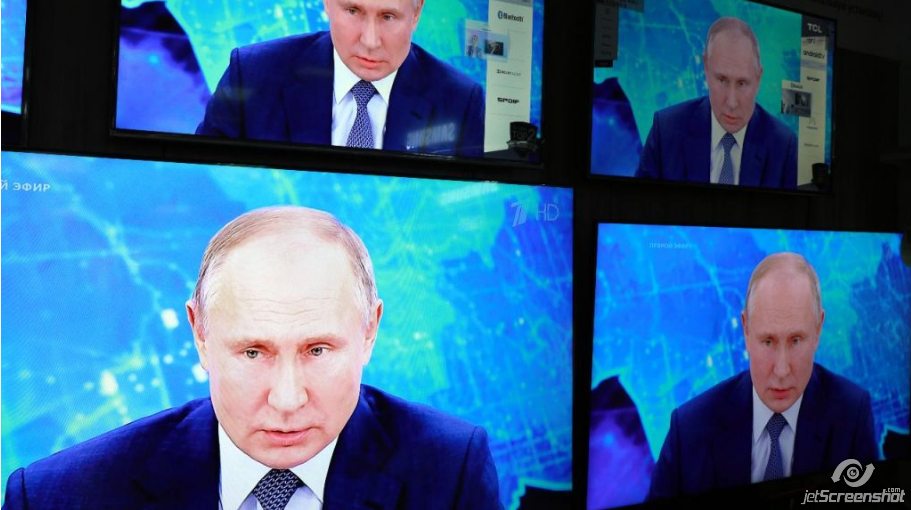By Kseniya Kirillova, for CEPA
The Kremlin has once again demonstrated that blackmail is its weapon of choice in dealings with the West.
When Russia’s current rulers decide to act, there are no half measures. Having launched a full-scale invasion of Ukraine, Russian officials have worked hard to cow opponents and to enforce their silence or acquiescence while the military operation is underway. There is no subtlety, thus the constant references to the risk of nuclear war.
That is the most eye-catching of Vladimir Putin’s threats, but there are many others. The Kremlin frequently exploits fears of civil war, threats of a yet-more radical successor, or any other possible risk to clear the field of opponents.
Fear of a Civil War
When addressing the domestic audience, one of the most effective types of blackmail used is the suggestion that any mass protests (or attempts at revolution), will inevitably lead to a bloody civil war. The sense of terror evoked by these images is one of the pillars of Kremlin propaganda, not only scaring people off any future attempts to change the government, but also forcing them to rally around the “national leader” in the present.
The fear of civil war in Russia is also used as an instrument of pressure on Western leaders. The main argument here is “the unpredictable consequences of chaos in a vast territory that possesses nuclear weapons.” For instance, Andrei Kortunov, director general of the Russian International Affairs Council, clearly pushes this idea in an open letter to the “composite Washington acquaintance” published on the website of the Carnegie Moscow Center:
“Be honest, John, are you able to predict the concomitant global and regional risks, the risks for US interests and security? We both remember well that the world was fortunate in 1991 to avoid violent turmoil in a nuclear superpower state . . . It’s not at all obvious that the same thing will happen next time. Won’t you agree that the current Russian military-security establishment somewhat differs from the old Soviet nomenklatura and will hardly acquiesce to collective political suicide?”
At the same time, the Russian regime has, knowingly or otherwise, done a great deal to ensure this scenario. If, before 2014, the possibility of civil war following regime change was practically zero, since then several factors have emerged to significantly enhance the possibility.
First, a constant mobilization of the population based on martial rhetoric and the cult of power invariably leads to increased social aggression and demands for a “strong” and authoritarian leader. Such an attitude is expressed in the record-high popularity of the Soviet dictator Josef Stalin, who, according to a July 2021 poll from the independent Levada Center, is viewed favorably by 60% of Russians. Russians of this outlook cited his virtues as “restoring order, lifting the country from its knees,” and “winning the war.” Put differently, they admire a “strong hand” and victory over an external enemy. In combination with the constant creation of imagined enemies, this cult of militarism and aggression increases the “explosiveness” of society.
Second, pro-communist sentiment is becoming more oppositional, and even Putin does not match the image of a “new Stalin” in the eyes of the “common people.” Additionally, the constant deterioration of Russia’s socio-economic situation, combined with the coronavirus pandemic, exacerbates popular discontent. As noted by Russian sociologists Sergey Belanovskiy and Anastasia Nikolskaya, even today, one can observe an “ideological imbalance”: the mutual alienization of power and the people alongside the radicalization of parties. Simultaneously, rising social tensions manifest through “shootings” and interethnic conflicts, thereby increasing the risk of armed confrontation in the future.
Third, in response to the growing inclination to protest, the government is spinning the flywheel of repression and aggravating the largely artificially-created contradictions between different parts of society. Meanwhile, for years, Russians have been instilled with distrust for the opposition as “enemies of the people” and a “terrorist underground.” For instance, according to polling data from the Levada Center, Russian dissident Alexei Navalny enjoys only middling support for his activities, and respondents are largely indifferent toward or divided over the government’s decision to label Navalny’s Anti-Corruption Foundation an extremist organization.
Fourth, sociologists Belanovskiy and Nikolskaya note an inclination to protest growing in the country. This trend will only be compounded by the fact that any successor to Putin, regardless of how they come to power, will have less legitimacy in the eyes of the people. A sharpening clan war between the oligarchs and a less effective repressive apparatus could loosen central control.
That said, there are still several factors that impede the realization of a “bloody scenario” in Russian society. First, the popular mentality is characterized by an excessive reliance on the state and a deeply rooted fear of revolution and “losing Russia” as a country, something the Kremlin skilfully manipulates to consolidate its support.
Additionally, the radical changes of recent years have created an especially irrational conformism in the mentality of the majority.
The Threat of a Radical Successor
A second fear that Kremlin propaganda has gradually instilled in both Russians and foreigners is blackmail predicated on the possibility that an even more radical and belligerent leader could replace Putin. Hopefully, the constraints placed on Russian leadership by society and the elite are more likely to rein in any successor.
But there is a real risk. Putin has no nominated successor and as his bizarre February 21, Security Council meeting demonstrated, his ministers and intelligence chiefs are cowed by their boss. So the possibility that Putin might be replaced by a military dictatorship is very possible, especially considering the growing influence of the army and special services in contemporary Russia.
Elsewhere, increasing demand for leftist populism might foreshadow what kind of leader might replace Putin. The main leftist ideologues, Sergey Udaltsov and Nikolay Platoshkin, benefit from calls for unrealistic social standards. Unlike Putin, they openly espouse aggressively anti-western positions that, while partially in line with the Kremlin’s foreign policy, appear more radical. While under house arrest in March 2014, Udaltsov welcomed the annexation of Crimea with delight and called for the annexation of the Donbas. He didn’t bother to conceal his ultimate goal: the re-establishment of the USSR. Since serving a sentence of four and a half years in prison over the so-called “Bolotnaya Case,” Udaltsov has continued his anti-Western rhetoric.
Meanwhile, the leader of the “Movement for a New Socialism,” Nikolay Platoshkin, has participated in Russian TV shows, where he also harshly criticized liberalism and the West, while referring to Ukraine as “Banderesque” (named after the far-right 20th-century Ukrainian nationalist leader) and “worthless.” The existence of such figures serves to soften perceptions of Putin as a distasteful, but preferable, leader.
Furthermore, there has been a steady rise in anti-oligarch sentiment in Russia for several years now. Any future leader choosing to repress oligarchs and/or pursue criminal cases against the most corrupt high-ranking officials, would likely win carte blanche from public opinion, including for a continuation of an aggressive foreign policy.
And yet, in practice, the factors reducing the likelihood of such developments are much greater. First, as the sociologists rightly point out, “the weakened legitimacy of a successor, his expected lack of initiative in the apparatus and lack of ideas, and the strengthening of the influence of the ‘collective leadership’ leave little hope for the ability of the authorities to resist the oligarchs’ lobbying.”
More likely, any Putin replacement will lack his charisma, and will find it difficult to maintain the balance created by Putin between the interests of the oligarchs and the security forces. Accordingly, such a person would be much more dependent on the oligarchs, who, in turn, are not interested in confrontation due to their financial dependency on the West.
Secondly, despite the majority of Russians’ distrust in the Western world, at present, there is no desire for war in Russian society. Only three years ago, sociologists determined a turning point in the public consciousness and an increased desire for a more peaceful foreign policy. Russians now mainly demand improved socio-economic circumstances, rather than external expansion. Moreover, according to the Levada Center, despite aggressive anti-American propaganda, the share of respondents with a positive attitude towards the United States exceeded the share of those with a negative attitude (45% and 42%, respectively) for the first time in several years in November. Even before then, anti-Western sentiment was an aberration stemming from the “rally around the flag” effect produced by the annexation of Crimea. Pre-2014 sentiments were favorable, rather than antagonistic. Therefore, trends in Russian attitudes today should be interpreted as a regression to the mean.
Third, since a change of power would be accompanied by the aggravation of existing problems and a decrease in the legitimacy of the successor in the eyes of the population, a new leader might well seek good relations with the West given the problems at home.
Nuclear Blackmail
Apart from the threat of civil war and a radical successor, the Kremlin also menaces its enemies with the possibility of nuclear war. On the one hand, the Kremlin is careful to stand by commitments to strategic stability and reaffirm that a nuclear war cannot be won and must never be fought. On the other hand, its propagandists and Vladimir Putin himself speak directly about the threat of a nuclear war with the West if Ukraine joins NATO.
“Such rhetoric is aimed at forcing the US to self-deter and reflect on a persistent question in Western domestic politics: ‘Is it worth it to risk nuclear war with Russia over this?’ The Kremlin actively manipulates such sentiments to advance its own agenda and push the boundaries of Western tolerance with frequent violations of international norms,” US army Lt-Col (Rtd.) Alexander Vindman, former Director of European Affairs of the National Security Council, said in an interview with the author.
In his opinion, the key for the West is to avoid self-deterrence. Despite its aggressive rhetoric, Kremlin officials are just as interested in avoiding nuclear escalation as Western officials.
“For instance, after the US military killed hundreds of Russian mercenaries employed by the Wagner Group during a battle near Khasham in the Deir Ez-Zor Governorate of Syria, the Russian government didn’t escalate tensions with the US. Instead, the Russian military practiced escalation control as it sought to avoid further confrontation with the US, while continuing to pursue its own objectives in Syria. The Kremlin only seeks to exploit what it perceives as the West’s willingness to back down when confronted with pressure and the threat of escalation,” Vindman said.
Many other Russian and American analysts also agree that the threat of nuclear war is a grandiose bluff designed to force the West to make concessions to Russia. Experts warn that the West should not succumb to Putin’s blackmail, or be brow-beaten compromise its own interests and the security of its allies.
By Kseniya Kirillova, for CEPA
Kseniya Kirillova is an analyst focused on Russian society, mentality, propaganda, and foreign policy. Author of numerous articles for the Jamestown Foundation, she has also written for the Atlantic Council, Stratfor, and others.
Photo: RYAZAN, RUSSIA – DECEMBER 17, 2020: A live TV broadcast of the 16th annual end-of-year news conference by Russia’s President Vladimir Putin at a home appliances store. Credit: Alexander Ryumin/TASS
Europe’s Edge is an online journal covering crucial topics in the transatlantic policy debate. All opinions are those of the author and do not necessarily represent the position or views of the institutions they represent or the Center for European Policy Analysis.





